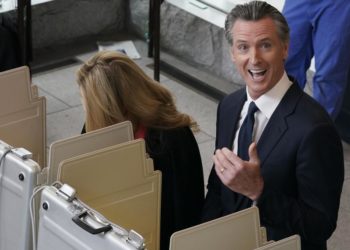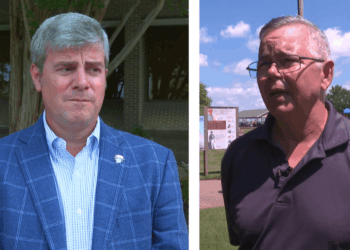Lebanon has two new leaders and neither is to Hezbollah’s liking. On Jan. 9, Gen. Joseph Aoun, commander of the Lebanese Armed Forces (LAF), was elected president with 99 out of 128 votes from Lebanese parliamentarians across the political spectrum. Nawaf Salam, president of the International Court of Justice (ICJ) and a Sunni who is backed both by Saudi Arabia and across Lebanon’s nonsectarian civil society, was appointed prime minister.
They were the candidates of national unity—and of finding a way to move past the country’s sectarian political system. That system was nearly the country’s undoing, especially after Hezbollah, the Shia-dominated militant group backed by Iran, fought a ruinous war with Israel in recent months.
Lebanon has two new leaders and neither is to Hezbollah’s liking. On Jan. 9, Gen. Joseph Aoun, commander of the Lebanese Armed Forces (LAF), was elected president with 99 out of 128 votes from Lebanese parliamentarians across the political spectrum. Nawaf Salam, president of the International Court of Justice (ICJ) and a Sunni who is backed both by Saudi Arabia and across Lebanon’s nonsectarian civil society, was appointed prime minister.
They were the candidates of national unity—and of finding a way to move past the country’s sectarian political system. That system was nearly the country’s undoing, especially after Hezbollah, the Shia-dominated militant group backed by Iran, fought a ruinous war with Israel in recent months.
Hezbollah preferred other candidates over Aoun and Salam, but it hasn’t resisted the new leadership at a time when it has been licking its wounds. “This was unthinkable,” said Sami Nader, a Lebanese political analyst. “For decades, Hezbollah has been calling the shots. But now, because of this geopolitical earthquake, since Hezbollah’s military defeat against Israel, since the toppling of Syrian President Bashar al-Assad, that whole Iranian axis has collapsed.” Everyone in Lebanon, including Hezbollah’s Shia base, is primarily focused on building international trust, bringing in aid and investment from both the West and the Gulf, and enabling the reconstruction of homes and villages.
And yet, Aoun and Salam face daunting challenges going forward. Will they manage to form a clean government and usher in much-needed political reforms—reforms that some lawmakers may resist? And, more urgently, will they actually succeed in disarming Hezbollah?
Hezbollah’s flags still hang from shops, billboards, and traffic crossings in its areas of influence. A friend based in the country said his concierge believed that Hezbollah leader Hassan Nasrallah had not died in the massive 80-ton bomb drop and was hiding in Iran somewhere. He expected Nasrallah to return as a mahdi, or messiah, at the time of his choosing.
Experts say that even as Hezbollah denies the severity of its losses in the war, it is aware of the need to rebuild southern Lebanon, parts of the Bekaa Valley, and the southern Beirut suburb of Dahiyeh, which are all home to its supporters and came under intense Israeli bombardment. According to the World Bank Lebanon needs an estimated $8.5 billion just to cover for the damages caused by the latest war.
“The party is now forced to go along with two candidates it opposed,” Michael Young, a senior editor at the Carnegie Middle East Center, posted on X. “Worse, if it wants Gulf funding for the reconstruction of mainly Shiite areas, it has to show a willingness to talk about disarmament and support economic reform. Reconstruction is their absolute priority.”
According to the 60-day cease-fire deal agreed upon by Israel and Hezbollah last November, both Israel and Hezbollah are supposed to withdraw from southern Lebanon. The deal also calls for the full implementation of United Nations Security Council Resolution 1701 by Jan. 26. The agreement says, “Lebanon’s official military and security forces, infrastructure, and weaponry will be the only armed groups, arms, and related material deployed in the southern Litani area” with the exception of U.N. peacekeepers, who are allowed in the region to monitor violations.
Earlier this month, U.N. Secretary-General António Guterres highlighted the risk posed by continued Israeli presence in the south and added that U.N. peacekeepers have discovered more than “100 weapons caches” belonging to Hezbollah and other groups since the cease-fire began.
Both Aoun and Salam emphasized the state’s right to be the only entity that carries weapons. “My pledge is to call for a defensive strategy and the establishment of a state—I repeat, a state—that invests in its army, controls all borders, and implements international resolutions,” Aoun said.
A politician from the Free Patriotic Movement (FPM), a former political ally of Hezbollah, said that Hezbollah was likely to disarm but only south of Litani and not elsewhere. “I think that it is a given that Hezbollah will abide by the implementation of 1701 and disarm in South of Litani,” he said, who spoke on the condition of anonymity. “North of Litani is yet to be discussed.”
Hezbollah was first told to leave the south at the end of the 2006 Lebanon War. It has taken the group two decades, and another war, to agree to evacuate southern Lebanon. To disarm Hezbollah north of the Litani will be an even bigger challenge.
The FPM politician said there was some talk that, under a new national defense strategy, Hezbollah’s fighters could be brought under the overall government command “without necessarily integrating it into the LAF, but maybe as a paramilitary force or something like that.”
Others have warned about leaving Hezbollah fighters to their own devices and thus unleashing the kind of chaos that befell Iraq after the United States invaded the country and banned Iraqi soldiers from being integrated in the armed forces. They argue that Hezbollah’s fighters must be offered an off ramp by inviting them to the LAF.
Gilbert Doumit, a Lebanese activist who fought the election as a part of a civil society group but lost, said Hezbollah is weak “but not as weak as we think.” It still has men and weapons, and it “can paralyze the country if not controlled.” To avoid that, he argued, then it must become a part of the LAF. “Is there a way to find a solution for a large percentage of Hezbollah fighters and to integrate them into the army?” he said. “Yes, I think there can be a mechanism, a dedicated unit for them. They are Lebanese, after all. “
But neither Hezbollah nor other political groups entrenched in Lebanon’s existing sectarian political system intend to make it easy for Aoun and Salam as they select their ministers for a new government and unleash reforms. “The [prime minister] can pick his cabinet but he needs to consult us,” said a politician belonging to a sect-based party, who spoke on the condition of anonymity. They added that Salam needs their support to make sure that he can pass a no-confidence motion.
But analysts like Nader believe the civil society movement is in the home stretch and that it is too late for the political class to run against the momentum. “Now is the best time for a cabinet of experts and for the parliament to vote special prerogatives to allow them to undertake radical reforms, for instance in the banking sector,” Nader said. “The parliament can but will not issue a no-confidence, not in my opinion. There is too much momentum, and no one wants to be in the losing camp.” However, he does fear that the old political class could delay the formation of a government to dampen spirits once again and wait out the positive political changes in Lebanon.
As the Lebanese welcome two qualified, unsullied people to top positions, they are cautiously optimistic. The country has endured far too much to celebrate just yet. “What do I think about Aoun and Salam? Ask me in six months,” said Samy, a Lebanese technician who did not want to give his full name due to the risk of being targeted in what is still a tense domestic situation.
The post Hezbollah Is Waiting for Lebanon’s New Leaders appeared first on Foreign Policy.




